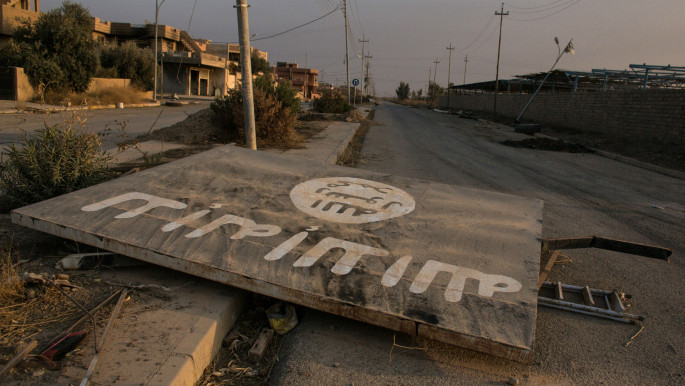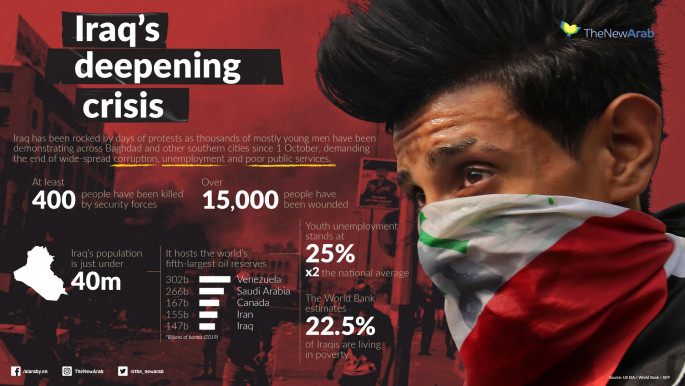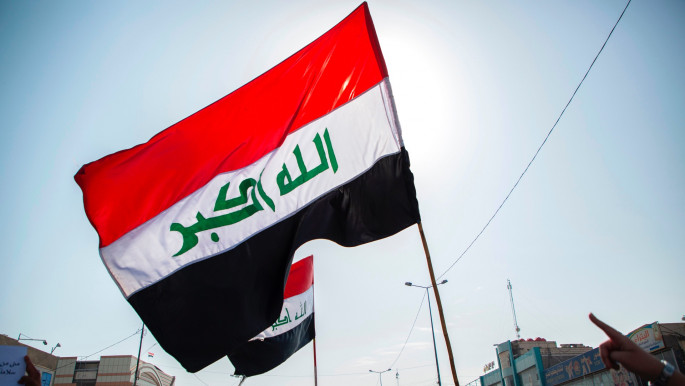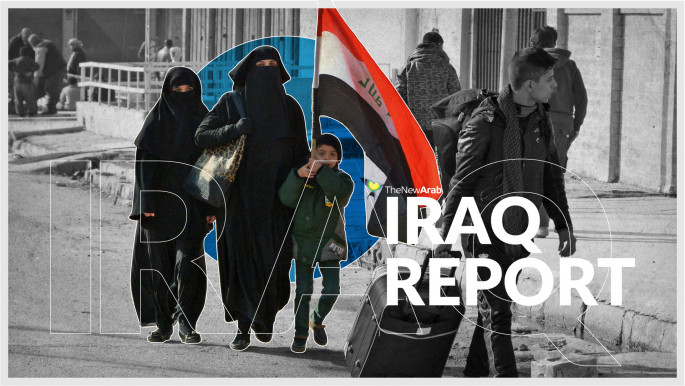The Iraq Report: Protest movement revives as coronavirus lockdown eased
Anti-government protesters have once again faced a hail of bullets and death as they resumed their activities following the easing of lockdowns and curfews linked to the ongoing coronavirus pandemic.
The Iraqi government is still in flux as the prime minister-designate has not yet managed to form a cabinet, but the Iraqi deep state is on full alert, showing demonstrators they will be killed if they continue to ask for change.
Death is not only being dealt out in the public domain but also behind closed doors as human rights watchdogs call on the Iraqi government to urgently implement domestic violence laws to protect vulnerable women in abusive relationships.
The tragic and brutal murder of a young Iraqi woman has once again shone a bright light on the ugly underbelly of a society that has seen women's rights ironically become less enshrined under a democratic system than it was under a brutal dictatorship.
Protesters face violence as US backs their demands
Protests have flared up once again in the Iraqi capital Baghdad as the authorities eased lockdowns and restrictions associated with the coronavirus that has swept across the world since the start of the year.
Demonstrators had gathered in central Baghdad's Tahrir Square to resume protests a week last Tuesday before men in civilian clothing descended on them armed with guns. Reports indicate that at least one protester was shot dead with a further ten suffering gunshot wounds.
 |
Anti-government protesters have once again faced a hail of bullets and death as they resumed their activities following the easing of lockdowns and curfews |  |
No one has claimed responsibility for the attacks, but previous reporting has indicated that government-aligned and Iran-backed Shia militias have stepped in to quell protests using deadly force. Many of the militiamen involved in violence against demonstrators are loyal to Shia cleric Moqtada al-Sadr whose political bloc currently enjoys the largest number of seats in parliament.
The Iraqi government announced that it would ease coronavirus restrictions just before the start of the Islamic holy month of Ramadan that began last week. This was reportedly in order to allow Iraqis to maintain some semblance of community and commerce during the month where Muslims fast from sunrise to sunset.
Read more: Protesters face live fire after Iraq partially lifts coronavirus lockdown
Markets and restaurants often see a boost in activity and profitability during Ramadan as Muslims prepare nightly family feasts to mark the end of their daily fasts. However, there were fears that the restrictions in place to slow the spread of the coronavirus would shutter businesses in Iraq's already fragile economy.
Economic concerns have long been an issue for Iraqi protesters who first took to the streets in October last year, demanding an end to corruption, more economic opportunity, and an end to sectarian politics.
 |
|
| Read more: The Iraq Report: Islamic State grows in power amid coronavirus outbreak |
Baghdad had repeatedly promised reforms, but protesters were instead met with death and violence, with more than 700 demonstrators killed since October.
The number of dead could be significantly higher as the Iraqi health ministry has also been accused of covering up the number killed by the coronavirus which has cast doubt on the government's figures for protester deaths.
There were fears the Iraqi government would use the coronavirus response as a way to finally shut protests down, but Iraqi activists have become more organised and have maintained a constant occupation of major public sites to keep up pressure.
In Tahrir Square, for example, demonstrators have taken to occupying the site in shifts to relieve the pressure of feeling the need to constantly be at a protest site. They have also enacted public health protocols, providing surgical masks, gloves, and disinfectant to maintain hygiene standards during the pandemic. This has allowed the protest movement to stay alive and not simply fizzle out over time.
In what is perhaps a twist of irony, the United States has also weighed in on one of the protesters key demands of ending sectarian politics.
Secretary of State Mike Pompeo said on Wednesday that the Trump administration wanted Iraq to end its sectarian quota system, known as the muhasasa system in Iraq.
"Iraqi leaders must put aside the sectarian quota system and make compromises that lead to government formation for the good of the Iraqi people, and the partnership between the United States and Iraq," Pompeo said.
"The Iraqi government, too, must heed the call from many elements of Iraqi society to bring all armed groups under state control, and we welcome steps that have been taken in the past days in that direction."
 |
Economic concerns have long been an issue for Iraqi protesters who first took to the streets in October last year, demanding an end to corruption, more economic opportunity, and an end to sectarian politics |  |
While some may welcome Pompeo's remarks as international support for a more consensus-based politics that does away with sectarianism, it is valid to say that it was the United States that installed the muhasasa system in the first place.
When former Baathist dictator Saddam Hussein was toppled by the US-led coalition in 2003 it ruled Iraq through an American governor, Paul Bremmer, who oversaw the work of the Iraqi Governing Council, an administrative body of 25 members, 13 Shia, 5 Kurds, and 5 Sunnis.
Read more: Iraq urged to introduce domestic violence law after woman's horrific death shocks the country
This marked the beginning of the sectarian quota system that has since been codified in the Iraqi constitution as requiring the president to be a Kurd, the parliamentary speaker a Sunni, and the prime minister a Shia. This 'Lebanonisation' of Iraqi politics has ensured a succession of weak and divided governments.
The US' decision to support the protesters' demands could simply be a change of policy reflecting a change of administrations, from the era of George W. Bush, to Barack Obama, and now Donald Trump. It is arguable the Trump administration may have seen the error of previous administrations' ways and changed tack.
A more cynical analysis would suggest that the US is now instead trying to clip the wings of the Shia Islamists they brought to power in 2003. Washington may feel these politicians, many of whom are openly supportive of Iran and its ambitions, are ungrateful for American facilitation of their rise to power and are now attempting to undermine them by empowering lesser represented segments of society.
 |
|
| Click to enlarge |
Either way, whether cynical or an honest reappraisal of policy, this can only be to the benefit of the Iraqi people. If the sectarian quota system is done away with then it will leave room for political parties to form – as opposed to parliamentary voting blocs – that have a more nationally oriented political outlook rather than simply being motivated by their sectarian interests.
However, it is unlikely Iran will be supportive of such measures as the status quo serves Tehran's interests. It is therefore extremely unlikely we will see this change occurring in the near future.
Iraq urged to protect women's rights
Iraq is in dire need of new domestic violence legislation after the suspicious and violent death of a 20-year-old woman in Najaf, Human Rights Watch has said.
The New York-based rights watchdog has urged Iraqi lawmakers to take action as the lockdown measures imposed by many governments worldwide have led to soaring rates of domestic violence, with women in war-ravaged countries like Iraq being particularly vulnerable.
 |
Death is not only being dealt out in the public domain, but also behind closed doors, as human rights watchdogs call on Iraq to urgently implement domestic violence laws to protect vulnerable women |  |
The calls came after the suspicious death of a young and recently married woman in the Shia shrine city of Najaf in Iraq's south earlier in April.
Videos emerged on social media showing the young woman, Samira, in hospital with severe burns amid speculation that she had been brutally beaten by her husband.
Samira's mother told HRW that her daughter had married her police officer husband eight months ago and she had since been isolated and banned from seeing her family except on one occasion.
Before she was hospitalised, her mother spoke to her son-in-law over the phone and could hear Samira screaming in the background. The man told the woman that Samira would be hospitalised after a "slight burn accident".
 |
|
| Read more: The Iraq Report: Can new PM-designate Kadhimi unite Iraq's fractured political scene? |
According to the mother, she rushed to the hospital to visit her daughter but was barred from entry by the husband's mother who refused to allow her to see her daughter. She was later allowed entry where Samira told her that her husband had been beating her so badly that she had threatened to set herself alight if he beat her again.
"I still don't know if he lit her on fire or she did it herself, but she told me she burned for three minutes while he just watched," the mother told HRW. "Finally, his father, also a policeman, came in and put out the fire."
"She begged them to take her to the hospital but they waited for over an hour before doing so. Her father-in-law then pretended to the police that he was her father and said to them the fire had been an accident."
Samira died a little over a week later on 18 April.
Najaf's governor, Luay al-Yasiri, told HRW that the dispute would likely be resolved through tribal mediation without any formal criminal charges being brought against the husband.
Iraq is infamous for allowing state employees such as police officers to abuse their power and to perpetrate crimes with relative impunity.
Police and other security officers are usually well-connected to powerful Shia militias who behave like organised criminals and so families like Samira's are at high risk of deadly retaliation should they attempt to push for criminal prosecution of abusive men.
Iraq remains one of the worst places in the world to be a woman, with a fifth of women being at risk of physical violence in 2006, with further studies in 2012 showing 36 percent of women suffering psychological abuse.
These figures may also be deflated by the fact that women suffering from abuse have nowhere to turn to and so crimes against them go largely unreported.
The Iraq Report is a fortnightly feature at The New Arab.
Click below to see the full archive.
 |
|





 Follow the Middle East's top stories in English at The New Arab on Google News
Follow the Middle East's top stories in English at The New Arab on Google News


